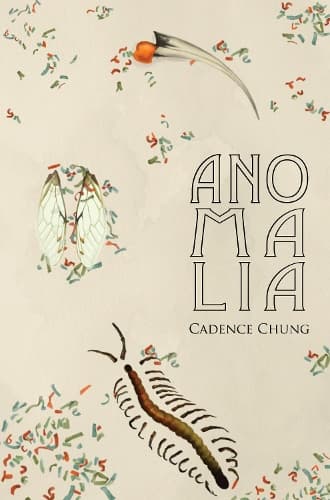Review — Anomalia by Cadence Chung
Reviewed by Elizabeth Heritage
Anomalia is the debut collection of toikupu from Te Whanganui-a-Tara poet Cadence Chung published by We Are Babies press. I read Anomalia in amongst listening to two audiobooks: Bill Bryson’s The Body and Madeline Miller’s Circe. Both turned out to be directly relevant – close anatomical investigation on the one hand and Western classical literature on the other.
Anomalia is a deceptively delicate-looking pukapuka containing a reaching vastness that I found compelling. One of the later toikupu is called magnum opus and by the time I got to it I just thought: ‘yep, fair enough.’ The poems of Anomalia consume the entire book – there’s one called table of contents, for example, and another called references. They return again and again to themes of collecting and dissecting curiosities, and the poetic speaker often refers to herself as “the anomaly” (hence the title): “try and fit your wild form into the domesticated curve of a kitchen”. Images of surgery and corpses repeat themselves: blood drips and pulses throughout
In Sane/Special, her essay published on the Pantograph Punch about being autistic, Chung writes that, “I often feel like a specimen myself. Some curio, each quirk to be laughed at or pondered over.” There is a deep sense of alienation present in Anomalia balanced by a powerful craving for connection, experience, life: “I’ll gorge myself on worms slicking / down my throat.” One toikupu is simply called “what i want” and every line contains the phrase “give me”
give me
veins through my skin so i see that i bleed give me
freckles so i see that i have touched the sun give me
wax wings so i can feel what it’s like to fall
Aha – there’s Icarus! He turns up in Circe as well. In her novel, Miller has the legendary witch create the monster Scylla. Transformed from a simpering nymph, Scylla’s powerful new incarnation gives her the freedom to gorge. Similarly, in belated wishes Chung writes:
i want to look like a bad omen like a harbinger like if someone saw
me they’d think o fuck I’ve really done it now i want to look evil
… i feel like everyone contains too much to be held in one
body
There is an expansive, hungry energy in every page of Anomalia that Chung successfully combines with authoritative precision. Some toikupu are almost fussy with what Chung describes in Sane/Special as her “Victorian good-girl aesthetic.” For example, from table of contents:
a piece of china on the beach
a shard of violet-stained glass
a violet between the pages of a book
These twee tchotchkes are interrupted near the end of the toikupu by “Sappho’s decaying corpse.”
Clearly, Chung is an artist to watch. I first came across her work in Stasis Journal and then again in Out Here: An Anthology of Takatāpui and LGBTQIA+ writers from Aotearoa. She has recently finished high school and now studies classical performance at Te Kōkī, the New Zealand School of Music. Last year saw the staging of her original musical, In Blind Faith. From here Chung could go anywhere.
In The Body, Bill Bryson talks about how the human brain is not fully developed until our mid-twenties, and how in our teenage years we experience an intensity of feeling never to be repeated. When I think about the things I wrote as a teenager being published, I feel a kind of full-body cringe. But in reading Chung’s mahi I am closer to awe. In tuesday afternoon, my beloved Chung writes:
I am young
and it seems like
everything is here
for me to have
And I can only conclude that yes, it is.
